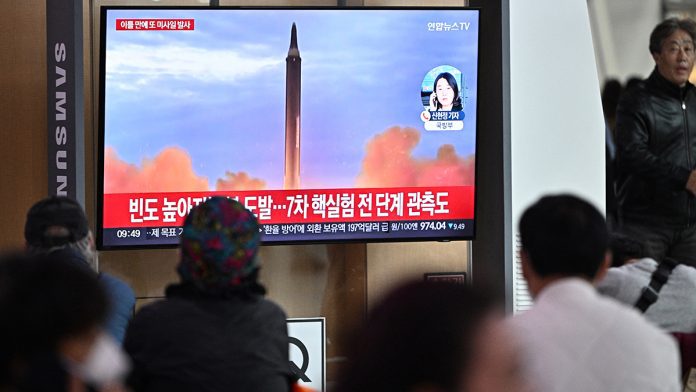North Korea on Thursday launched two new ballistic missiles and called the weapons tests “just retaliation” against Washington and Seoul and their military exercises in the region. The new firing occurred during a UN Security Council meeting in New York to discuss the launch of another North Korean missile that flew over Japan two days ago.
According to the South Korean military, two short-range missiles were fired from around Pyongyang towards the Sea of Japan on Thursday morning. The Japanese Coast Guard confirmed the detection of these projectiles. According to South Korean military analysis, the first missile traveled 350 km at a maximum altitude of about 80 km. The other covered a distance of 800 km at an altitude of 60 km.
rapid fire
This sixth launch in less than two weeks is “absolutely unacceptable”, Japanese Prime Minister Fumio Kishida reacted quickly. According to Seoul and Washington, the Hwasong-12 missile flew over Japan on Tuesday and covered a range of about 4,600 km, which is probably Pyongyang’s longest range in its tests so far. It was the first time in five years that a North Korean projectile passed over Japanese territory.
North Korea, which adopted a new doctrine in September to position its nuclear power as “irreversible”, this year intensified its firing and launched an intercontinental ballistic missile (ICBM) for the first time since 2017.
“The Korean People’s Army’s retaliation against joint military maneuvers between South Korea and the United States is escalating military tensions on the Korean peninsula,” North Korea’s ministry said in a press release on Thursday.
Anti-submarine exercises and naval maneuvers
Following Tuesday’s launch, Washington called an emergency meeting of the United Nations Security Council. But North Korea’s ally and economic partner China also blamed the US.
Chinese Deputy Ambassador to the United Nations Geng Shuang told the council that Pyongyang’s missile tests are “closely linked” to US-South Korean military exercises. He accused Washington of “poisoning the regional security environment”.
Seoul, Tokyo and Washington have stepped up joint military maneuvers in recent weeks, including anti-submarine exercises and large-scale naval maneuvers.
On Wednesday, South Korea and the United States fired five ballistic missiles – one of which crashed after launch – at hypothetical targets in the Sea of Japan. And a day earlier, the air forces of both the countries had conducted a shooting exercise in the Yellow Sea. Seoul also announced a return to the field of the US nuclear-powered aircraft carrier USS Ronald Reagan, which conducted exercises with the South Korean Navy in September.
We are in a cycle of armed provocation
The Security Council meeting was supported by France, the United Kingdom, Albania, Norway and Ireland. US Ambassador to the United Nations Linda Thomas-Greenfield condemned “an apparent attempt by China and Russia to reward (North Korea) for their bad actions”, and called for tougher sanctions against Pyongyang.
In May, Beijing and Moscow vetoed a Security Council resolution imposing new sanctions on North Korea after the body unanimously adopted heavy sanctions in 2017.
According to analysts, the regime of North Korean leader Kim Jong Un is taking the opportunity of a standoff at the United Nations to further advance its weapons testing.
Seoul and Washington expect North Korea to resume its nuclear tests, which have been interrupted since 2017, perhaps after the Chinese Communist Party Congress that begins on October 16.
“At this point, it would seem prejudicial to his interests for Kim to step back and stop the provocation. Not to mention the amount of resources wasted on conducting these weapons tests,” Rand Corporation analyst Soo Kim told AFP. “We are certainly in a cycle of armed provocation”, He accepted.

Amateur web specialist. General food junkie. Typical zombie enthusiast. Avid music trailblazer. Lifelong explorer.







